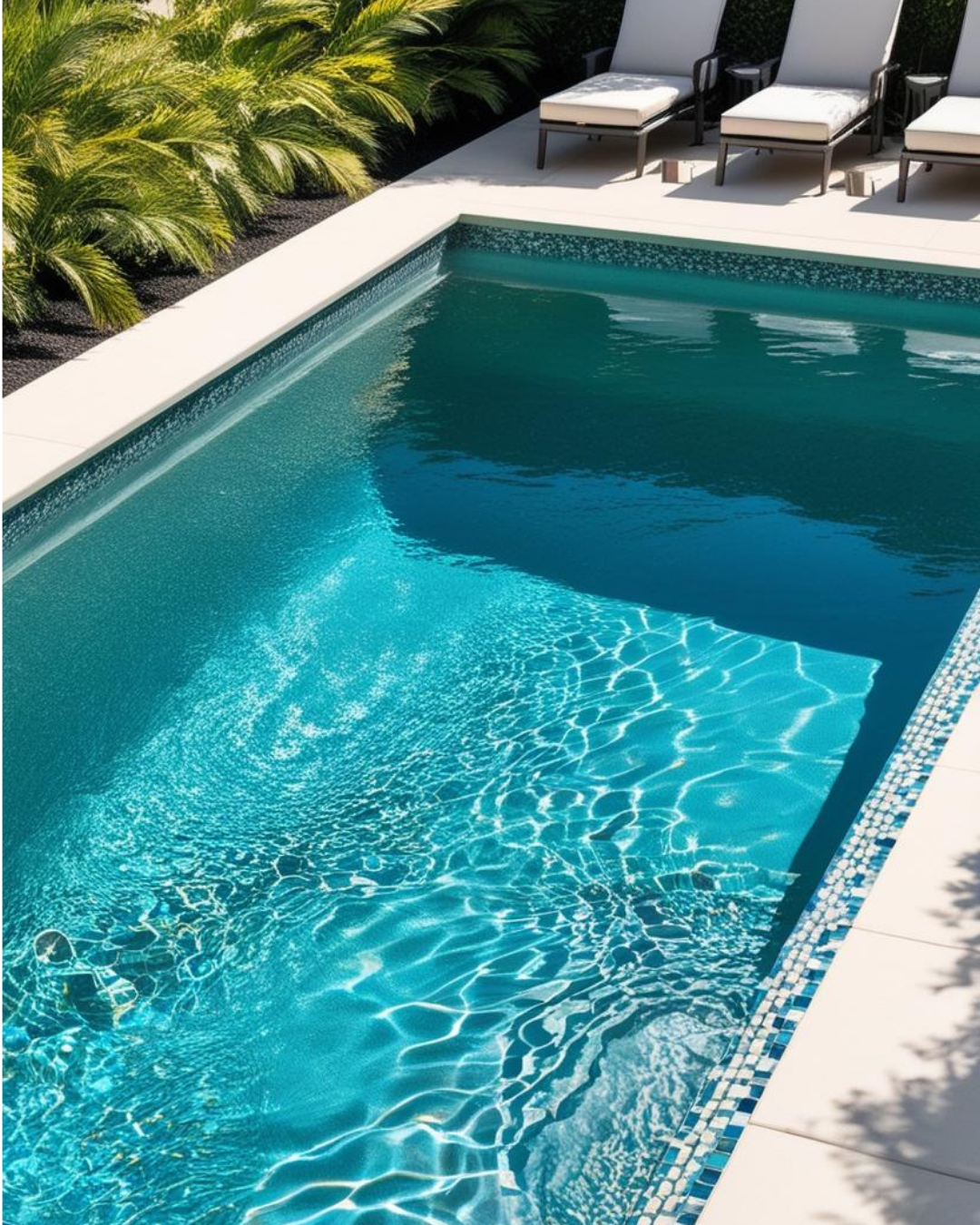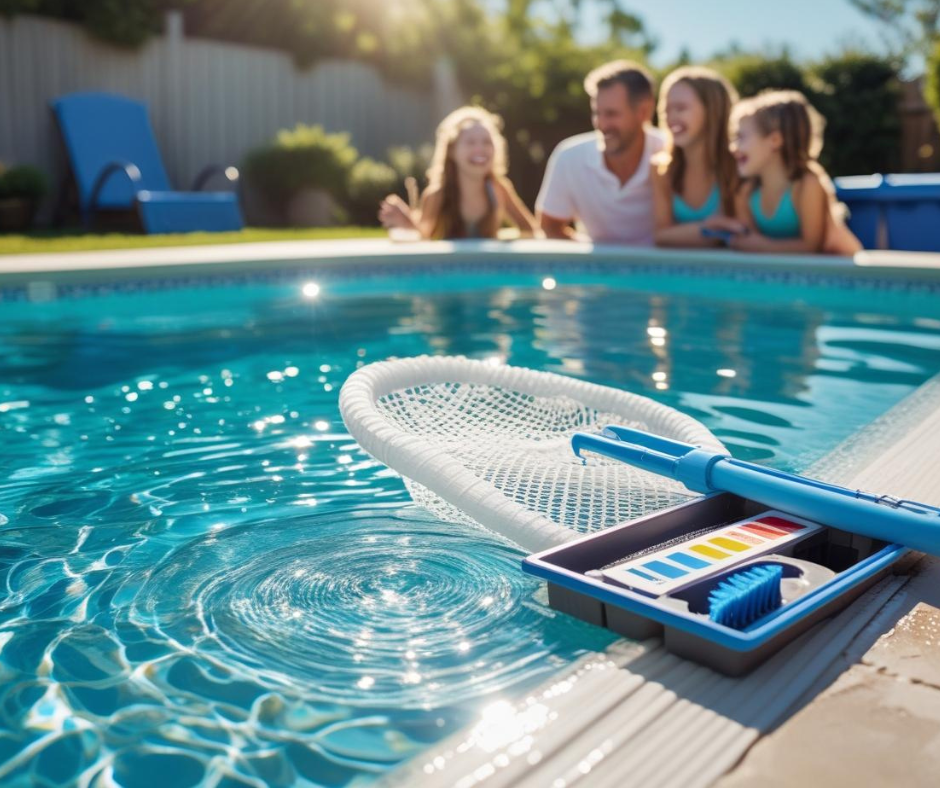Pool maintenance services aren’t just for emergencies—they’re your year-round ticket to crystal-clear, swim-ready water. Tired of murky water, stubborn algae, or debris settled at the bottom? You’re not alone—and we’re here to help.
In this seasonal guide, you’ll learn how often to clean your pool, which tools and steps make a difference, and expert tips on handling issues like algae, dirty salt cells, and filter maintenance. Whether you’re tackling things yourself or considering hiring help, this guide will simplify your routine and give you the confidence to keep your pool in perfect shape.

Schedule Your Pool Service Today
Weekly vs. Monthly Pool Cleaning Tasks
Weekly Pool Maintenance Tasks
Keeping up with weekly maintenance is essential for safe and swim-ready water:
- Skim debris off the surface to prevent clogging and reduce organic material that leads to algae.
- Test and balance water chemistry:
- Free chlorine: 1–3 ppm
- pH level: 7.2–7.8
- Total alkalinity: 80–120 ppm
- Calcium hardness: 200–400 ppm
- Brush the walls and floor to remove any buildup and disrupt early algae formation.
- Vacuum the pool using a manual or automatic cleaner to remove debris from the floor.
- Run the filtration system for 8–12 hours daily to ensure adequate water circulation and filtration.
- Backwash the sand filter weekly or whenever pressure rises 8–10 psi above the baseline reading.
Monthly Pool Maintenance Tasks
Once a month, perform a deeper clean to prevent long-term damage and improve efficiency:
- Clean the salt cell (for saltwater pools):
- Turn off the system, remove the cell, and soak it in a 1:4 acid-to-water solution (1 part muriatic acid to 4 parts water) for 10–15 minutes.
- Rinse thoroughly and reinstall.
- Check and clean skimmer and pump baskets.
- Inspect filter media for signs of wear or clogging.
- Deep vacuum and brush hard-to-reach areas like steps, lights, and corners.
Factors That Influence Pool Cleaning Frequency
Several variables may increase or reduce how often you should clean your pool:
- Pool Type: Above-ground and inground pools differ in design and debris exposure.
- Usage Frequency: More swimmers = more oils, dirt, and bacteria.
- Weather Conditions: Hot, sunny days accelerate algae growth. Storms can dump dirt and organic debris.
- Surroundings: Trees, landscaping, and local dust can contribute to contamination.
- Water Chemistry Stability: If your chemical levels fluctuate often, you’ll need more frequent maintenance.
Firefighter Pools’ Custom Maintenance Plans
No two pools are exactly alike—which is why Firefighter Pools offers flexible, personalized cleaning plans tailored to your environment, usage, and equipment.
Our services include:
- Weekly and monthly maintenance packages
- Chlorine or saltwater system upkeep
- Shock treatments to eliminate algae
- Salt cell cleaning using safe, acid-wash techniques
- Brushing and vacuuming for all surfaces
- Sand filter backwashing and inspection
Our trained team ensures your pool remains clean, balanced, and worry-free all season long.
How to Clean a Pool with Algae
A green, cloudy pool typically means algae has taken hold. Follow these expert-approved steps to clean it effectively:
- Shock the pool with a high dose of chlorine to destroy algae spores.
- Brush all pool surfaces—walls, floor, and steps—to break up biofilm and expose algae to sanitizer.
- Run the filtration system continuously for 24–48 hours to remove algae particles from circulation.
- Vacuum any settled debris at the bottom.
- Retest and rebalance the water before swimming again.
If algae returns quickly, it may be due to poor circulation, high phosphates, or imbalanced chemistry—professional help can pinpoint the root cause.
How to Clean a Salt Cell in a Saltwater Pool
Saltwater pools rely on clean salt cells to generate chlorine. Here’s the safe method to clean yours:
- Turn off the power to the chlorinator system.
- Remove the cell and inspect it for white, crusty scale.
- Soak it in a 1 part muriatic acid to 4 parts water solution for 10–15 minutes.
- Rinse thoroughly with a garden hose.
- Use a cleaning stand or container to keep the unit stable and safe during cleaning.
Always wear gloves and eye protection when handling acid, and add acid to water—never the reverse.
How to Clean the Bottom of a Swimming Pool
Debris and sediment naturally settle on the pool floor—especially after heavy use or wind. Here’s how to keep it clean:
- Use a manual or robotic vacuum to remove dirt and organic material.
- Brush debris toward the deep end to collect it more efficiently.
- For heavy buildup or algae blooms, consider partially draining and deep-cleaning the pool.
- Schedule professional deep cleaning for neglected or seasonal pools.
How to Clean and Maintain a Sand Filter
A clean sand filter is key to healthy water. Here’s the proper way to clean it:
- Turn off the pump.
- Set the valve to “Backwash” and run for 2–3 minutes or until water in the sight glass runs clear.
- Set the valve to “Rinse” for 1 minute.
- Return the valve to “Filter” mode.
- Restart the pump.
Sand should be replaced every 3–5 years depending on use and water chemistry. If pressure continues to rise quickly, it may be time for a sand change.
Why Hire a Professional Pool Cleaning Service?
While DIY pool care is doable, working with professionals provides these key benefits:
- Accurate and consistent water testing and chemical balancing
- Proper maintenance of filters, pumps, and chlorinators
- Safe and effective algae removal and shock treatments
- Custom maintenance plans based on your pool’s unique needs
- Time savings and peace of mind
Wondering who to trust with your pool? Learn how to find the best pool cleaning service near you for reliable, local expertise that fits your needs.
Ready for Stress-Free Pool Maintenance?
Consistent care is the key to a clean, safe pool. From scrubbing away algae to cleaning salt cells and filters, smart upkeep keeps your water crystal clear and swim-ready.
Firefighter Pools takes the hassle out of maintenance with flexible, custom plans that fit your schedule.
Book your pool maintenance services today—and enjoy a spotless pool without the stress.
References






